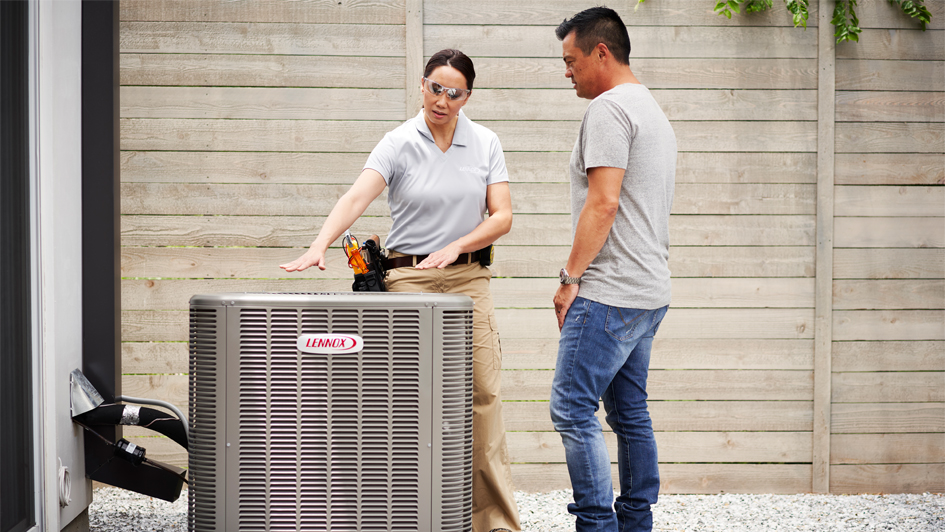
Selecting the right HVAC system size for your home is crucial. It affects your comfort and your power expenses. In this HVAC sizing guide, the experts at J & J Air Conditioning will explain how to select the best size of heating and cooling system for your home, what factors they take into account and why choosing the ideal size HVAC is so important to your convenience.
How Does HVAC System Size Affect Your Home Comfort and Efficiency
Proper HVAC size is different from home to home. Your HVAC system needs sufficient heating and cooling capacity to make your entire home pleasant. It shouldn't have to work extremely hard to keep up in extremely warm or cold weather. However, an HVAC system that's too big is inefficient, increases your energy expenses and can cause problems that make your home less enjoyable.
Critical Features Professionals Consider for HVAC Sizing in Eastland, TX
To determine the appropriate HVAC system size for a home, the HVAC installation specialists at J & J Air Conditioning carry out a Manual J load calculation to determine how many British Thermal Units (BTUs) are required to heat and cool and the home. A Manual J calculation evaluates multiple elements, such as:
- Square footage: The size of the home is arguably the most crucial factor in selecting the size of your HVAC system. How much space will your new HVAC system be required to keep comfortable?
- Insulation levels in the home: A properly insulated home retains the indoor temperature more efficiently, which can influence how much heating and cooling capacity you need.
- Regional Climate: The local climate in Eastland, TX, has a significant role in finding the appropriate size HVAC. Homes in hotter climates might need a system with an increased cooling capacity, while cooler regions may demand less.
- Number of windows: Windows can be a considerable source of energy loss. The number, size, type of glass used, and whether they’re single or double paned can significantly impact heating and cooling requirements.
- Sun and shade: A home that receives a lot of sunlight will automatically be warmer than one that doesn't, which affects central air sizing. Positioning in relation to prevailing winds and number of nearby shade trees also influence the appropriate HVAC size.
Common HVAC Size Mistakes to Avoid
A frequent mistake homeowners make when sizing their own HVAC system is to focus only on square footage. Although the square footage of your home has a significant impact on what size HVAC you need, other considerations also influence how much heating and cooling capacity is required to keep your home pleasant.
Another typical mistake is not hiring a professional. It's crucial to have a qualified HVAC technician carry out a Manual J calculation, which takes all the essential elements into consideration to determine the right HVAC size.
Why Is Your Home HVAC System Size Important?
An incorrectly sized system can lead to comfort problems and drive up your monthly power bills. Here's a closer look at the pitfalls of a incorrectly sized HVAC:
Undersized HVAC system problems:
- Shorter system life and breakdowns: HVAC systems that don't have enough power often operate continuously to try to heat or cool a home, leading to increased wear and tear. This can cause breakdowns and even require premature HVAC replacement.
- An uncomfortable home: Small HVAC systems are too weak to heat and cool your whole home, which can lead to hot, stuffy rooms or areas of your home that are far too cool.
- Increased energy bills: An underpowered HVAC system that runs continuously trying to keep up uses more energy, running up your monthly power bills and costing you money. A properly sized and energy-efficient HVAC system uses less power and helps to lower your monthly bills.
Issues from oversized HVAC systems
- Wasted money: Larger HVAC systems tend to cost more money, so purchasing more heating and cooling capacity than your home needs is an avoidable expense.
- Shorter system life and breakdowns: HVAC systems that are excessively large often start and stop frequently, referred to as short cycling. This can result in wear and tear on your equipment, shortening its service life or requiring HVAC repair.
- Excessive indoor humidity: An HVAC system should balance indoor air moisture, but an oversized HVAC system may lack adequate runtime to accomplish that task. This can cause indoor air quality issues, such as mold growth.
Get the Right HVAC System Size by Working With the Pros at J & J Air Conditioning
Now that you have learned some of the factors that impact what HVAC system size is right for you, it's time to find a new heating and cooling system. J & J Air Conditioning is here to help.
We’ll evaluate your home and provide you with a free, no-obligation estimate for HVAC installation. We’ll analyze your home to find the ideal HVAC system size for you, so you can have a comfortable home every day of the year.
Call 254-505-3248 today to schedule your free estimate for HVAC installation in Eastland, TX.

